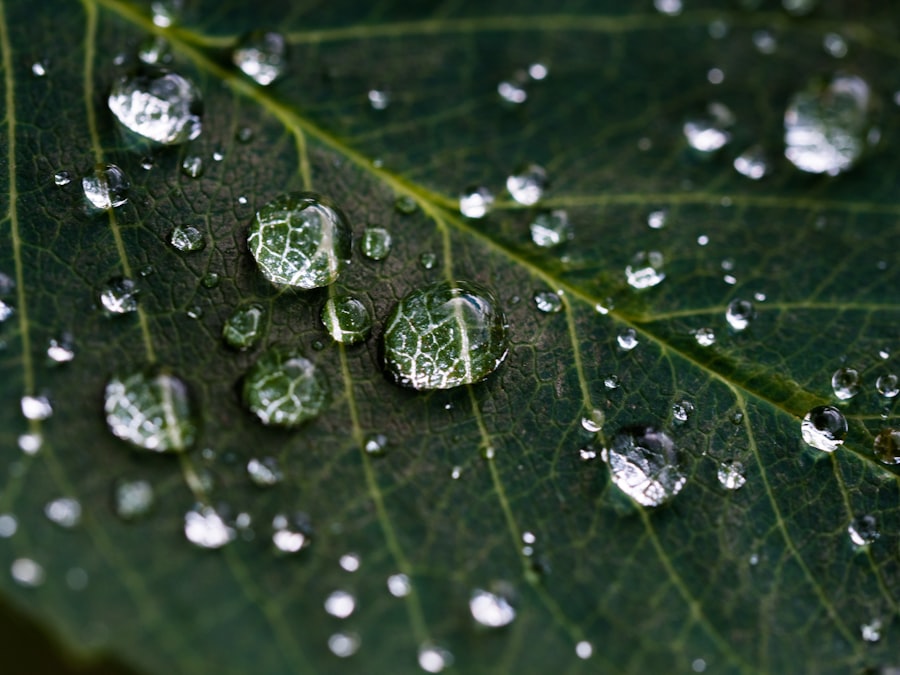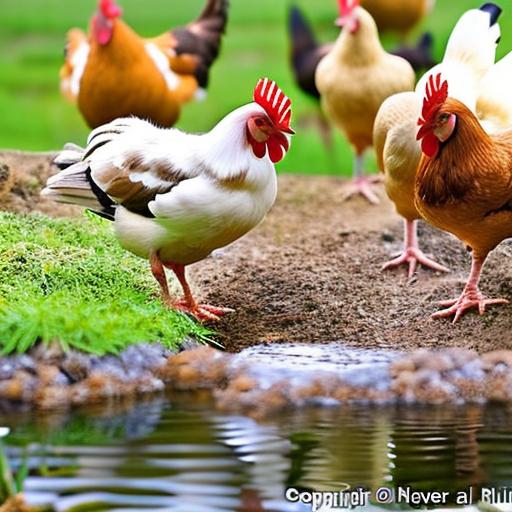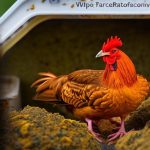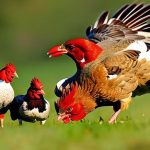Clean water is essential for the health and well-being of chickens. Just like humans, chickens need access to clean and fresh water in order to survive and thrive. Water plays a crucial role in a chicken’s overall health, digestion, temperature regulation, and egg production. However, there are several factors that can affect the quality of water available to chickens, including contaminants such as bacteria, algae, and minerals. It is important for chicken owners to understand the importance of clean water and take steps to ensure that their flock has access to high-quality water.
Key Takeaways
- Clean water is crucial for the health and well-being of chickens.
- Common water contaminants, such as bacteria and heavy metals, can have negative effects on chickens’ health and egg production.
- Testing water quality regularly can help identify and address potential issues.
- Choosing the right watering system and regularly cleaning and maintaining equipment can help prevent water quality problems.
- Supplementing chickens’ water with vitamins and electrolytes can help maintain their health and hydration.
Importance of Clean Water for Chickens
Water is vital for a chicken’s health and well-being. It is involved in many important bodily functions, including digestion, nutrient absorption, temperature regulation, and waste elimination. Chickens require water to break down food in their digestive system and absorb nutrients effectively. Without enough water, chickens can suffer from dehydration, which can lead to a variety of health issues.
Clean water is also crucial for preventing diseases in chickens. Contaminated water can harbor harmful bacteria and parasites that can cause illnesses such as salmonella or coccidiosis. These diseases can have serious consequences for the health of the flock and can even lead to death in severe cases. By providing clean water, chicken owners can significantly reduce the risk of disease transmission among their flock.
In addition to preventing diseases, clean water can also improve egg production in chickens. Water plays a vital role in the formation of eggs, as it helps transport nutrients to the developing embryo. If chickens do not have access to clean water, their egg production may be negatively affected. By ensuring that their flock has access to clean and fresh water at all times, chicken owners can help maximize egg production.
Common Water Contaminants and Their Effects on Chickens
There are several types of contaminants that can affect the quality of water available to chickens. These contaminants can have various effects on a chicken’s health and well-being.
One common water contaminant is bacteria. Bacteria such as E. coli or salmonella can be present in water sources and can cause diseases in chickens. These bacteria can lead to symptoms such as diarrhea, decreased appetite, and lethargy. In severe cases, bacterial infections can be fatal for chickens.
Another common water contaminant is algae. Algae growth in water sources can be harmful to chickens. Algae can produce toxins that can cause digestive issues and liver damage in chickens. Additionally, algae growth can make the water unpalatable for chickens, leading to decreased water intake and potential dehydration.
Minerals such as iron, manganese, or sulfur can also contaminate water sources. While these minerals are not necessarily harmful to chickens in small amounts, high levels of minerals can affect the taste and quality of the water. Chickens may refuse to drink water that has a strong metallic or sulfuric taste, leading to decreased water intake and potential dehydration.
How to Identify and Test for Water Quality Issues
| Water Quality Issue | Identifying Factors | Testing Methods |
|---|---|---|
| pH Levels | Unusual taste, corrosion of pipes, skin irritation | pH test strips, pH meter |
| Chlorine Levels | Strong odor, skin irritation, discolored water | Chlorine test kit |
| Hardness | Soap scum, mineral buildup, dry skin | Water hardness test kit |
| Bacteria | Illness, diarrhea, foul odor | Bacterial culture test, coliform test |
| Lead | Discoloration, metallic taste, developmental issues | Lead test kit, professional lab testing |
It is important for chicken owners to be able to identify potential water quality issues in their flock. There are several signs that can indicate a problem with the water source.
One common sign of water quality issues is a change in behavior or appearance in chickens. If chickens suddenly become lethargic, have decreased appetite, or show signs of digestive issues such as diarrhea, it may be an indication that the water they are drinking is contaminated.
Another sign of water quality issues is a change in egg production or quality. If egg production suddenly decreases or if the eggs have abnormal shells or colors, it may be a result of poor water quality.
To test for water quality issues, chicken owners can use various methods. One simple method is to visually inspect the water source for any signs of contamination such as algae growth or discoloration. Additionally, there are test kits available that can measure the levels of contaminants such as bacteria or minerals in the water. These test kits can provide valuable information about the quality of the water and help chicken owners take appropriate measures to address any issues.
Choosing the Right Watering System for Your Flock
There are several types of watering systems available for chickens, each with its own pros and cons. The choice of watering system will depend on factors such as the size of the flock, the availability of water sources, and personal preferences.
One common type of watering system is the traditional waterer. This is a simple and inexpensive option that consists of a container filled with water and a small opening for chickens to drink from. Traditional waterers are easy to clean and maintain, but they can be prone to contamination if not properly managed.
Another option is the nipple waterer system. This system consists of small nipples that release water when chickens peck at them. Nipple waterers are a popular choice for larger flocks as they can provide a constant supply of clean water. However, they can be more expensive and require more maintenance compared to traditional waterers.
A third option is the automatic waterer system. This system uses a float valve or a pressure regulator to automatically refill the water container when it reaches a certain level. Automatic waterers are convenient and can ensure a constant supply of clean water for chickens. However, they can be more expensive and may require professional installation.
Cleaning and Maintaining Watering Equipment

Regardless of the type of watering system used, it is important to regularly clean and maintain the equipment to ensure clean water for chickens. Dirty or contaminated watering equipment can lead to health issues in chickens and decrease their overall well-being.
To clean watering equipment, start by emptying and rinsing out the containers or pipes thoroughly. Use a brush or sponge to scrub away any dirt or debris that may have accumulated. For stubborn stains or mineral deposits, a mixture of vinegar and water can be used as a natural cleaning solution. Rinse the equipment thoroughly after cleaning to remove any residue.
In addition to regular cleaning, it is important to regularly inspect the watering equipment for any signs of damage or wear. Replace any worn or damaged parts to ensure that the equipment functions properly and does not leak or become contaminated.
Preventing Algae Growth in Water Sources
Algae growth in water sources can be a common problem for chicken owners. Algae can not only affect the taste and quality of the water but can also be harmful to chickens if consumed in large quantities.
There are several ways to prevent algae growth in water sources. One method is to provide shade for the water containers or pipes. Algae thrive in sunlight, so providing shade can help reduce their growth. This can be done by placing the water containers under a tree or using covers or shades specifically designed for this purpose.
Another method is to regularly clean and scrub the water containers to remove any algae that may have started to grow. This can help prevent further growth and keep the water clean and fresh for chickens.
Additionally, some chicken owners use natural additives such as barley straw or hydrogen peroxide to prevent algae growth. These additives can help inhibit the growth of algae without harming chickens or affecting the taste of the water. However, it is important to follow the instructions provided by the manufacturer when using these additives.
Tips for Preventing Bacterial Infections in Chickens
Bacterial infections can be a serious concern for chicken owners, as they can lead to diseases and even death in chickens. It is important to take steps to prevent bacterial infections and ensure that chickens have access to clean and bacteria-free water.
One important step is to regularly clean and disinfect the watering equipment. Bacteria can thrive in dirty or contaminated equipment, so regular cleaning is essential. Use a mild detergent or disinfectant to clean the equipment, and rinse thoroughly to remove any residue.
Another important step is to provide a clean and sanitary environment for chickens. Regularly clean the chicken coop and remove any waste or debris that may attract bacteria. Keep the coop dry and well-ventilated to prevent the growth of bacteria.
Additionally, it is important to regularly monitor the health of the flock and promptly address any signs of illness. If a chicken shows symptoms of a bacterial infection, isolate it from the rest of the flock and seek veterinary care if necessary.
Watering Strategies for Hot and Cold Weather
Extreme temperatures can have a significant impact on a chicken’s water intake. In hot weather, chickens may drink more water to stay hydrated and regulate their body temperature. On the other hand, in cold weather, chickens may drink less water due to decreased thirst and increased moisture content in their feed.
To ensure that chickens have access to clean water in hot weather, it is important to provide ample water sources and monitor their water intake. Consider using larger water containers or multiple waterers to accommodate increased water consumption. Additionally, provide shade or shelter for the water containers to prevent overheating.
In cold weather, it is important to regularly check the water sources for freezing. Chickens cannot drink frozen water, so it is important to thaw the water or provide alternative sources such as heated waterers or warm water. Additionally, consider increasing the moisture content in the chickens’ feed to compensate for decreased water intake.
Supplementing Chickens’ Water with Vitamins and Electrolytes
Supplementing chickens’ water with vitamins and electrolytes can provide additional benefits for their health and well-being. Vitamins and electrolytes can help boost the immune system, improve digestion, and support overall health in chickens.
There are several types of vitamin and electrolyte supplements available for chickens. These supplements are typically added to the drinking water according to the manufacturer’s instructions. It is important to follow the recommended dosage to avoid over-supplementation, which can be harmful to chickens.
When administering supplements, it is important to provide a separate water source without supplements for chickens to drink from. This allows chickens to regulate their own intake of supplements and ensures that they do not consume excessive amounts.
Troubleshooting Common Watering Problems in Your Flock
Despite best efforts, there may be times when watering problems arise in a flock. It is important to be able to troubleshoot these issues and take appropriate measures to address them.
One common problem is water leakage or spillage. This can occur due to damaged or worn-out equipment or improper installation. Check the watering equipment for any signs of damage or wear and replace any faulty parts. Additionally, ensure that the equipment is properly installed and does not leak or spill water.
Another common problem is water contamination. This can occur due to dirty or contaminated equipment, algae growth, or bacterial contamination. Regularly clean and maintain the watering equipment to prevent contamination. Use natural additives or cleaning solutions to inhibit algae growth. Monitor the health of the flock and promptly address any signs of bacterial infections.
Clean water is essential for the health and well-being of chickens. It plays a crucial role in their overall health, digestion, temperature regulation, and egg production. By providing clean water, chicken owners can prevent diseases, improve egg production, and ensure the overall well-being of their flock.
It is important for chicken owners to understand the different factors that can affect water quality and take appropriate measures to ensure clean water for their flock. Regular cleaning and maintenance of watering equipment, prevention of algae growth, and proper supplementation can all contribute to maintaining high-quality water for chickens.
By prioritizing water quality in their flocks, chicken owners can help ensure the health and happiness of their chickens and promote optimal egg production.
If you’re looking for tips on how to keep your chickens’ water clean, you might also be interested in learning about the best practices for insulating a chicken coop. Insulating your coop can help regulate the temperature inside, keeping your chickens comfortable and healthy throughout the year. To find out more about how to insulate a chicken coop, check out this informative article on Poultry Wizard: https://poultrywizard.com/keeping-chickens/how-to-insulate-a-chicken-coop/.
FAQs
What are the common sources of contamination in chicken water?
The common sources of contamination in chicken water are dirt, feces, feathers, and food particles. These can harbor harmful bacteria and parasites that can cause diseases in chickens.
How often should I change my chicken’s water?
You should change your chicken’s water at least once a day. If the water becomes dirty or contaminated before the day ends, change it immediately.
What type of water container is best for chickens?
A water container that is easy to clean and refill is best for chickens. Plastic or metal containers are good options. Avoid using containers made of porous materials like wood, as they can harbor bacteria.
How can I prevent algae growth in my chicken’s water?
You can prevent algae growth in your chicken’s water by keeping the water container out of direct sunlight and cleaning it regularly. You can also add a small amount of apple cider vinegar to the water, which can help prevent algae growth.
Can I add supplements to my chicken’s water?
Yes, you can add supplements to your chicken’s water, but make sure to follow the manufacturer’s instructions and not exceed the recommended dosage. Some supplements can affect the taste of the water, so monitor your chickens’ water intake to ensure they are drinking enough.
What should I do if my chicken’s water becomes contaminated?
If your chicken’s water becomes contaminated, immediately remove the water container and clean it thoroughly with hot, soapy water. Rinse it well and refill it with fresh, clean water. If your chickens show signs of illness, consult a veterinarian.
Meet Walter, the feathered-friend fanatic of Florida! Nestled in the sunshine state, Walter struts through life with his feathered companions, clucking his way to happiness. With a coop that’s fancier than a five-star hotel, he’s the Don Juan of the chicken world. When he’s not teaching his hens to do the cha-cha, you’ll find him in a heated debate with his prized rooster, Sir Clucks-a-Lot. Walter’s poultry passion is no yolk; he’s the sunny-side-up guy you never knew you needed in your flock of friends!







